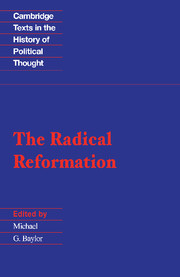Book contents
- Frontmatter
- Contents
- Preface
- List of abbreviations
- Introduction
- Chronology 1521–1528
- Bibliographical note
- 1 Thomas Müntzer, The Prague Protest
- 2 Thomas Müntzer, Sermon to the Princes (or An Exposition of the Second Chapter of Daniel)
- 3 Andreas Karlstadt, Letter from the Community of Orlamunde to the People of Allstedt
- 4 Conrad Grebel, Letter to Thomas Müntzer
- 5 Andreas Karlstadt, Whether One Should Proceed Slowly
- 6 Thomas Müntzer, A Highly Provoked Defense
- 7 Felix Manz, Protest and Defense
- 8 Anonymous, To the Assembly of the Common Peasantry
- 9 Hans Denck, On the Law of God
- 10 Hans Hut, On the Mystery of Baptism
- 11 Michael Sattler, The Schleitheim Articles
- 12 Balthasar Hubmaier, On the Sword
- 13 Hans Hergot, On the New Transformation of the Christian Life
- Appendices: Programs of the Peasants' War
- Biographical notes
- Index of subjects
- Index of proper names
- Index of biblical references
- Cambridge Texts in the History of Political Thought
13 - Hans Hergot, On the New Transformation of the Christian Life
Published online by Cambridge University Press: 05 June 2012
- Frontmatter
- Contents
- Preface
- List of abbreviations
- Introduction
- Chronology 1521–1528
- Bibliographical note
- 1 Thomas Müntzer, The Prague Protest
- 2 Thomas Müntzer, Sermon to the Princes (or An Exposition of the Second Chapter of Daniel)
- 3 Andreas Karlstadt, Letter from the Community of Orlamunde to the People of Allstedt
- 4 Conrad Grebel, Letter to Thomas Müntzer
- 5 Andreas Karlstadt, Whether One Should Proceed Slowly
- 6 Thomas Müntzer, A Highly Provoked Defense
- 7 Felix Manz, Protest and Defense
- 8 Anonymous, To the Assembly of the Common Peasantry
- 9 Hans Denck, On the Law of God
- 10 Hans Hut, On the Mystery of Baptism
- 11 Michael Sattler, The Schleitheim Articles
- 12 Balthasar Hubmaier, On the Sword
- 13 Hans Hergot, On the New Transformation of the Christian Life
- Appendices: Programs of the Peasants' War
- Biographical notes
- Index of subjects
- Index of proper names
- Index of biblical references
- Cambridge Texts in the History of Political Thought
Summary
“Guard yourself, devil – hell will soon collapse.”
Three transformations have taken place. God the father brought about the first with the Old Testament. God the son brought about the second transformation for the world in the New Testament. The holy spirit will bring about the third change with a future transformation of the bad situation in which people now find themselves.
In order to promote the honor of God and the common good, I, a poor man, know those things which are in the future: that God will humble all social estates, villages, castles, ecclesiastical foundations and cloisters. And he will institute a new way of life in which no one will say, “That is mine.”
The cities will be humbled, their buildings reduced to ruins, and their inhabitants and crafts will abandon them. The villages will become rich in property and people, and all their grievances will be redressed. The nobility of birth will pass away, and the common people will occupy their houses. Cloisters will lose the four mendicant orders and the right to beg, and the other rich cloisters will lose what they possess in payments and rents. All religious divisions will pass away together and be made into a single church. All resources – such as woods, water, meadows, etc. – will be used in common. Each land will have no more than a single lord; spiritual and temporal lords, regardless of their current form, will pass away. Our obedience to spiritual and temporal lords will find an end.
- Type
- Chapter
- Information
- The Radical Reformation , pp. 210 - 226Publisher: Cambridge University PressPrint publication year: 1991



